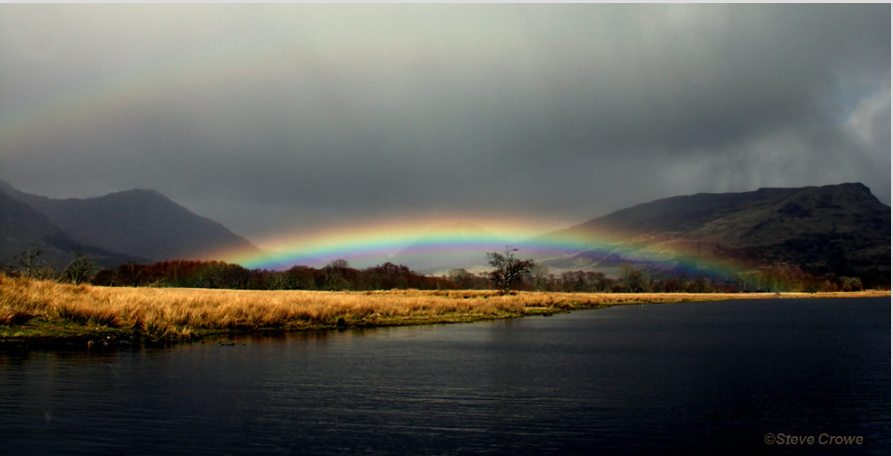Low rainbow, Loch Awe Scotland
Low Rainbow at Loch Awe, Scotland: A Spectacular Optical Phenomenon
Loch Awe, situated in the picturesque landscapes of Scotland, has witnessed its fair share of atmospheric wonders. Among these captivating sights is the elusive low rainbow, an optical phenomenon that never fails to leave observers in awe. In this article, we delve deeper into the intricacies of the low rainbow and explore the fascinating factors that contribute to its formation.
The Enigmatic Centre of a Rainbow
At the heart of every rainbow lies its center, which always appears directly opposite the sun. The position of the sun in the sky plays a crucial role in determining the height at which the rainbow appears. As the sun climbs higher, the rainbow descends lower. In the case of Loch Awe's low rainbow, it was Steve Crowe who had the privilege of witnessing this extraordinary event. With the sun positioned approximately 40° above the horizon, the bow manifested itself at a notably lower altitude.
The Influence of Sun Angle
The angle of the sun in relation to the primary bow's radius is a key determinant in the visibility of a rainbow. When the sun is positioned higher than the primary bow's radius of 42°, the bow can only be observed below the horizon. Conversely, during sunrise or sunset, when the sun sits lower in the sky, it produces a mesmerizing rainbow that stretches high above the ground.
Unveiling the Mechanics
To comprehend the mechanics behind the formation of a low rainbow, it is essential to understand how sunlight interacts with water droplets suspended in the air. When sunlight passes through these droplets, it undergoes refraction, or bending, which causes it to disperse into its constituent colors. This dispersion gives rise to the vibrant hues that adorn the sky during a rainbow spectacle.
The Role of Raindrop Size
The size of raindrops plays a pivotal role in determining the intensity and visibility of a rainbow. Larger raindrops tend to produce more prominent and vivid rainbows, while smaller droplets result in fainter, subtler displays. The interplay between the size of the raindrops and the angle of the sunlight creates the perfect conditions for a low rainbow to grace the skies above Loch Awe.
Atmospheric Conditions and Perspective
Apart from sun angle and raindrop size, various atmospheric conditions can influence the appearance of a low rainbow. The presence of moisture in the air, such as mist or light rain, enhances the likelihood of witnessing this captivating phenomenon. Furthermore, the observer's perspective also plays a role. Standing at the right distance from the water surface, combined with an optimal viewing angle, allows for a breathtaking view of the low rainbow against the backdrop of Loch Awe's serene beauty.
The Magic of Nature's Palette
Rainbows have long captivated human imagination with their vibrant colors and ethereal beauty. The primary rainbow typically displays a sequence of colors ranging from red on the outer edge to violet on the inner edge. However, low rainbows often exhibit a narrower band of colors due to their lower position in the sky. Despite this, their enchanting allure remains intact, leaving onlookers spellbound.
Chasing Rainbows: A Symbol of Hope
Throughout history and folklore, rainbows have been regarded as symbols of hope, luck, and harmony. The sight of a low rainbow can evoke a sense of wonder and awe, reminding us of nature's splendor and its ability to create breathtaking spectacles. It serves as a gentle reminder that even during challenging times, beauty can emerge from the most unexpected places.
Capturing the Elusive Low Rainbow
Photographing a low rainbow requires both patience and good timing. To capture this extraordinary phenomenon in all its glory, one must be prepared to venture out during the optimal conditions. Early morning or late afternoon, when the sun is at a lower angle, provides the best opportunity to witness and photograph the low rainbow at Loch Awe. Armed with a camera, an adventurous spirit, and an appreciation for nature's wonders, photographers can immortalize this ephemeral spectacle.
The Legacy of Loch Awe's Low Rainbow
Loch Awe's low rainbow serves as a testament to the remarkable interplay between light, water droplets, and atmospheric conditions. Its ethereal presence captivates both locals and visitors alike, leaving an indelible mark on their memories. As we continue to unravel the mysteries of the natural world, phenomena like the low rainbow remind us of the awe-inspiring beauty that surrounds us and the limitless wonders waiting to be discovered. So, if you find yourself near Loch Awe on a misty morning or a tranquil evening, keep your eyes peeled for the magical low rainbow that may grace the sky, offering a glimpse into nature's enchanting palette.

Loch Awe, Scotland imaged in April '06 by Steve Crowe (more images). The centre of a rainbow is always directly opposite the sun. The higher the sun, the lower is the bow. The sun was about 40° high when Steve saw this bow. When the sun is higher than the primary bow's radius of 42° a bow can only seen below the horizon. Close to sunrise or sunset the low sun produces a rainbow high in the sky. ©2006 Steve Crowe, shown with permission.
Note: this article has been automatically converted from the old site and may not appear as intended. You can find the original article here.
Reference Atmospheric Optics
If you use any of the definitions, information, or data presented on Atmospheric Optics, please copy the link or reference below to properly credit us as the reference source. Thank you!
-
<a href="https://atoptics.co.uk/blog/low-rainbow-loch-awe-scotland/">Low rainbow, Loch Awe Scotland </a>
-
"Low rainbow, Loch Awe Scotland ". Atmospheric Optics. Accessed on April 29, 2024. https://atoptics.co.uk/blog/low-rainbow-loch-awe-scotland/.
-
"Low rainbow, Loch Awe Scotland ". Atmospheric Optics, https://atoptics.co.uk/blog/low-rainbow-loch-awe-scotland/. Accessed 29 April, 2024
-
Low rainbow, Loch Awe Scotland . Atmospheric Optics. Retrieved from https://atoptics.co.uk/blog/low-rainbow-loch-awe-scotland/.